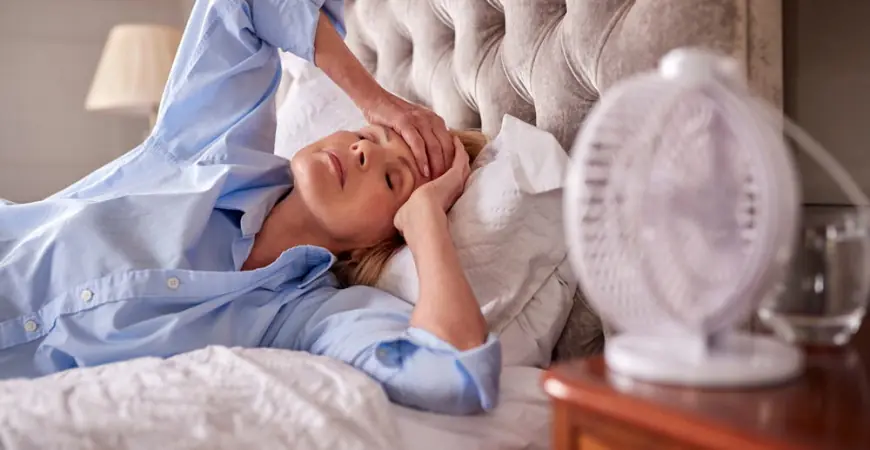Menopause and Night Sweats: What’s Causing the Heat and How to Find Relief
Menopause is a natural transition in a woman’s life, but it doesn’t always feel so natural, especially when night sweats make restful sleep nearly impossible.

Menopause is a natural transition in a woman’s life, but it doesn’t always feel so natural, especially when night sweats make restful sleep nearly impossible. Waking up drenched in sweat, throwing off blankets, or changing clothes at 3 a.m. can become a frustrating routine. These night sweats are not just uncomfortable, they’re one of the most common and disruptive symptoms of menopause.
What Are Night Sweats?
Night sweats are intense hot flashes that happen during sleep. Unlike mild overheating, these episodes cause excessive sweating that can soak through clothing and sheets. They may be accompanied by heart palpitations, anxiety, or disrupted sleep cycles.
While other medical issues can cause night sweats, for many women in midlife, they are directly tied to menopausal changes.
The Hormonal Link: Why Menopause Triggers Night Sweats
The primary cause of night sweats during menopause is a drop in estrogen levels. Estrogen plays a key role in regulating the hypothalamus, the part of the brain that controls body temperature. When estrogen levels fluctuate or decline, the brain misinterprets body temperature, triggering a sudden cooling response—sweating.
Additionally, reduced levels of progesterone and imbalances in other hormones can amplify this effect, making night sweats more frequent and intense.
Understanding the Stages of Menopause and When Night Sweats Occur
Night sweats can occur in different phases of the menopausal journey. Here's how they relate to the stages of menopause:
-
Perimenopause (the transition phase):
This stage typically begins in a woman’s 40s and can last for several years. Hormone levels start to fluctuate, and symptoms like irregular periods, mood swings, and hot flashes, including night sweats, become common.
-
Menopause (officially marked after 12 months without a period):
Night sweats can intensify during this stage due to significant estrogen decline. Sleep disturbances become more noticeable, and many women experience insomnia triggered by heat and discomfort.
-
Postmenopause (after menopause is complete):
While symptoms usually decline, some women continue to experience night sweats for years after their periods stop, especially without support from diet, lifestyle, or supplements.
Other Contributing Factors
Night sweats during menopause may also be worsened by:
-
Stress or anxiety
-
Spicy foods or caffeine before bedtime
-
Alcohol consumption
-
Tight or synthetic sleepwear
-
Poor sleep hygiene or overheating bedrooms
Addressing these triggers is key to managing symptoms effectively.
How to Find Relief: Natural and Effective Solutions
Managing night sweats doesn’t always require hormonal therapy or prescription medication. Many women find relief through simple lifestyle changes and menopause natural supplements that support hormonal balance.
1. Create a Cool Sleep Environment
-
Use breathable cotton bedding and pajamas.
-
Keep the room temperature between 60–67°F (16–19°C).
-
Use a fan or consider moisture-wicking bed sheets.
2. Adjust Your Diet
-
Avoid caffeine, alcohol, and spicy foods in the evening.
-
Focus on magnesium-rich foods (like leafy greens and seeds) and hydration.
-
Include phytoestrogen-containing foods like flaxseeds, tofu, and lentils.
3. Manage Stress Naturally
-
Practice relaxation techniques such as deep breathing, yoga, or meditation before bed.
-
A short evening walk can also help reset your body’s natural rhythm.
4. Try Menopause Natural Supplements
Supplements are gaining popularity as a gentler, non-hormonal way to manage symptoms like night sweats. Key ingredients to look for include:
-
Black Cohosh – Traditionally used to relieve hot flashes and sweating.
-
Ashwagandha – Supports adrenal health and stress reduction.
-
Red Clover – Contains natural phytoestrogens that may reduce intensity of hot flashes.
-
Magnesium & Vitamin B6 – Help regulate mood, sleep, and hormone metabolism.
-
Evening Primrose Oil – May help reduce hot flashes and improve skin hydration.
Always consult a healthcare provider before starting any new supplement, especially if you’re taking other medications.
When to Seek Medical Advice
If night sweats are severe, persistent, or impacting your quality of life, it’s important to consult a healthcare provider. In some cases, they could signal other underlying issues such as thyroid problems or infections.
For some women, hormone replacement therapy (HRT) may be a viable option, but it’s not suitable for everyone. Many prefer starting with natural approaches first.
Final Thoughts
Night sweats during menopause can be exhausting and frustrating, but they are manageable. By understanding the stages of menopause and how hormone fluctuations impact your body, you can take control with the right combination of lifestyle adjustments and natural menopause supplements.
What's Your Reaction?
 Like
0
Like
0
 Dislike
0
Dislike
0
 Love
0
Love
0
 Funny
0
Funny
0
 Angry
0
Angry
0
 Sad
0
Sad
0
 Wow
0
Wow
0
















































